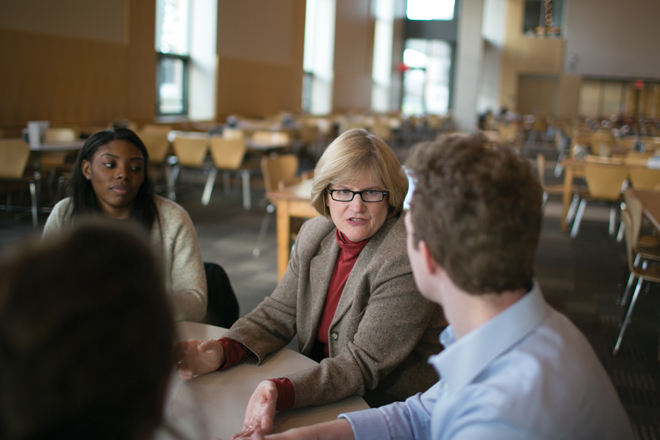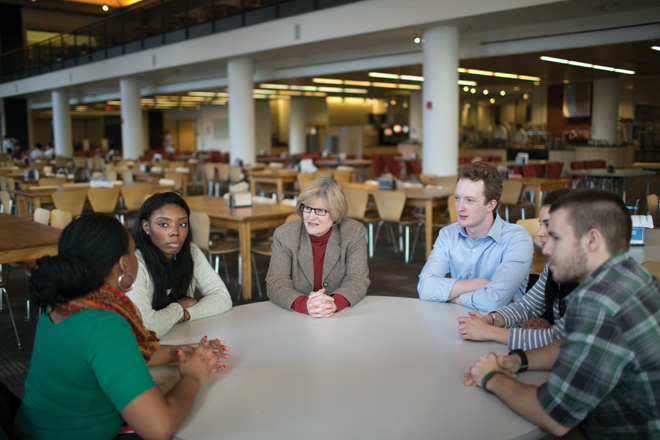Clayton Spencer
PROFILE-April 2013
By Sarah Braunstein
Photographs by Matt Cosby
Grit and Shared Enterprise: Clayton Spencer, the eighth president of Bates College, comes to Maine
She grew up here. Not here exactly, not in Lewiston, but on other college campuses, in other presidents’ houses. Higher education, she likes to say, is the family business. There’s a certain inevitability in Clayton Spencer’s career trajectory. On October 26, 2012, Spencer was inaugurated as president of Bates College— only the eighth in the institution’s 158-year history. You could say her whole life has been preparation for this, yet Spencer seems one of those sui generis people who came to learning on her own, who follows her own compass. Yes, the privileges of higher education were available to her from birth. Yes, she had access to great minds, great books, from the start. And yet Spencer’s life, with all its twists and turns, feels strikingly like one of her own making.
Born in 1954 in North Carolina, Ava Clayton Spencer (she has always dropped “Ava”—a name she shares with her mother and daughter) was one of four children of Samuel Reid Spencer, Jr. and Ava Clark Spencer, both progressive Southerners, who met at Harvard after World War II. She was raised in the segregated—and desegregating—South, in the era when Brown v. Board of Education demanded racial integration.
Harvard president Drew Faust, in her remarks at the Bates inauguration of Spencer, said, “Clayton grew up in an environment where issues of equality and justice were the stuff of everyday lives and choices—and in an environment where education was identified as the most powerful engine for social change. As I think about all she has undertaken since those early years, I believe it has been impelled by a fierce commitment to justice and to equal opportunity that grew out of that early experience.”
Spencer’s father was a history professor and dean at Davidson College in North Carolina. When Spencer was two years old, the family moved to Virginia, where her father assumed the presidency of Mary Baldwin College. A decade later Davidson wanted him back, as president. So before the age of 13, young Clayton Spencer pleased-and-thank-you’d with professors across the disciplines, and was touched by the passion of people who live their lives in pursuit of knowledge.
But her parents didn’t push learning on her, or look over her shoulder. “They were extremely laissez-faire,” Spencer explains. “They never helped with homework. It wasn’t like education was a point of emphasis, it was just the air we breathed.”
She was a child who, for the longest time, didn’t read fiction, for she was devoted to “the truth.” She preferred “kid biographies” of the presidents. (And, later, biographies of writers like Zora Neale Hurston and Richard Wright). Seriousness, plus a desire to be “in on the action,” were hallmarks of her childhood.
“Because we lived in a small college town that didn’t have restaurants or other entertainment, anybody who came to the college came to our house for dinner. From my very earliest years I was always interested in participating. My sister and I would set the table, get ready for the party—but I wanted to stay, to hear all the conversation. The honest truth is that I’m a better adult than I was a kid. As a kid I was always interested in the adult world. I would read Beezus and Ramona”—the classic Beverly Cleary novel about an impish, whimsical little girl—“and I’d wish I were like that, but I wasn’t.”
What character from literature was she like?
She hungered for the climate (both meteorological and intellectual) of Louisa May Alcott’s Little Women, set in Concord, Massachusetts. “We all identified with Jo, right?” she says. “But I identified with the weather as well. And I identified with the fact that Jo could just be this intellectual. I was pretty young when I read it, but I knew: I have to get to that place. I loved the New England weather, the substance, Jo’s intellectualism. I have always wanted to be substantively engaged with the world.”
By 13, back in North Carolina, she had an ear and eye to everything that happened on Davidson’s campus. The debates over the Vietnam War, race, and politics; the lectures, convocations, socializing… Spencer drank it all in. She loved this atmosphere, didn’t miss a beat, but knew at her core that someday she would leave the South. “The more mannered quality of culture in the South, particularly as it related to women and girls … well, I always felt at some inchoate level that if I stayed in the South I wouldn’t be able to be fully myself.”
And so her last year of high school was completed at Philips Exeter Academy in New Hampshire. She went on to Williams College, where she earned a bachelor’s degree in history in 1977, then to Oxford for a bachelor’s in theology. New England called her back, first for a master’s in religion at Harvard, and then to Yale Law School, where she was an editor of the Yale Law Journal.
Beginning in 1989, Spencer served as an assistant U.S. attorney in Boston; in 1993 she became chief education counsel to the U.S. Senate Committee on Labor and Human Resources under Senator Edward Kennedy’s chairmanship. Senator Kennedy was a tremendous influence: “He was hugely progressive and relentless in pursing his goals, but very pragmatic. That was formative. You can be idealistic and get nothing done; or you can be idealistic, keep your eye on the ball, and take a set of practical steps to advance your goals.”
She left government in 1997 and moved to Cambridge, Massachusetts, where she served first as associate vice president and then vice president for policy at Harvard, and also for a time as acting executive dean of the Radcliffe Institute for Advanced Study. At Harvard, she was a central player in financial aid reform, her steadfast goal to make a Harvard education affordable to all deserving students, no matter their financial status. For 15 years she was not a public figure, but a deeply influential player.
“Of her Harvard time,” Drew Faust says, “I think I can sum it up nicely by borrowing the words of our dean of admissions, William Fitzsimmons: Everything good that happened at Harvard between when she arrived in 1998 and when she left last June was because of Clayton Spencer and everything bad that happened was something she objected to.”
So she thrived at Harvard, and was by all accounts extraordinarily successful. Why leave? Quite simply, Maine called.
For many who fantasize about moving to Maine, the dream is born from summer vacations: those piney, sea-sprayed islands where blueberry-stained children run free. This is how Maine begins for a lot of people, and it’s how it began for Spencer. From 1986 on, she spent a week or two every summer on gorgeous, exclusive Sutton Island with her two children. Harvard owned a home there, and faculty and administrators could rent it for a week each summer (her then-husband was Harvard faculty). But always the vacation ended. Always back to the cosmopolitan world. Not that she was complaining: “I loved what I did at Harvard! But if headhunters called asking if I was interested in a presidency, I would always say: ‘Call me when it’s in Maine.’”
Her interest went deeper than Maine’s beauty. “I read The Country of the Pointed Firs, and I knew: not only am I all about New England, but I’ve got to get to Maine. For me, Maine represented the elemental, the outdoors, a kind of ruggedness of existence, and a reserve that I respect. Maine doesn’t give itself up easily. There’s a sense of privacy, reserve, and self-sufficiency in people. And then once you get to know them, they open up. One of the ways I think about it: Maine is a granite state, not a sand state. What I respect most about New England—and Maine—is its substance.”
She was not shy about these feelings, and talked about Maine whenever she got the chance. So, she says, “when the Bates job came up, when there were just rumors that the Bates job was coming up, ten people called me. ‘OK,’ they said, ‘it’s your moment.’”
An important higher-education job in the state of her dreams? Check. But what about this particular college? And what about Lewiston? (Not exactly posh Sutton Island, after all.) What she soon learned about Bates’s progressive identity thrilled her, this woman from the South who’d grown up breathing the air of social change: “Such a distinctive history and mission! Founded by abolitionists. No fraternities or sororities. Coed from the beginning. This is hugely important to me.”
And what she learned about Lewiston delighted her just as fully. She makes a list of the things she loves about Lewiston-Auburn, which includes the view of the river from Gritty McDuff’s Brew Pub, the “mesmerizing” architecture of the area’s mills, the kindness and helpfulness of its residents, the drive-thru Starbucks (“that would have been enough to win me over!”), the family diners, dive bars, the grittiness…
Grittiness?
Grittiness is a term of profound endearment for Spencer. “My father’s mother was from southern aristocracy, and my father’s father was from a family of dirt farmers.
So he had the refinement, intellect, and interests of the aristocracy, and the grit of the dirt farmer. He was the least snobby person. One of the reasons I love Lewiston and I love Maine is that I love the grittiness. I probably love it even more than my dad. I am completely not proper!”
It’s worth noting that when Spencer finally decided to stop renting and purchase a home on an island in Maine (in 2003), she didn’t opt for Sutton Island. Instead she bought a place on Swan’s Island: “It’s not a posh island. It’s a working island. It’s gorgeous in an elemental way. A lot like Lewiston.” She describes it as an island for “preachers and teachers,” which is how Bates, too, is known.
So, taking all this into account—her history, her geographic preferences, her commitment to substance and social justice—Clayton Spencer decided that she really, really wanted to become the president of Bates. She chuckles: “Then the trick was getting the search committee to figure that out.”
They did. And come 2012, in the presence of her mother and father (now in their late eighties and nineties), in the presence of more than 2,500 onlookers, she gave an inauguration speech that she’d been preparing, in some way or another, since her childhood. She reminded her audience why this kind of education matters, why new technologies cannot replace place-based residential education, but why a strong liberal arts institution must fully embrace and explore the world of which it’s a part, not shut itself off from it. She described a mindset embedded in the DNA of Bates College—standing firmly on principle and encountering the world with energy and confidence.
“If success for colleges and universities was defined for the past 30 years as a niche competition based on wealth and prestige, in the next decades success will go to the institutions that engage most robustly and effectively with the forces that are shaping our world.”
She shared big ideas and big hopes on the stage that day, but she spoke just as clearly and pragmatically about the challenges the college faces. (One imagines Senator Kennedy would be proud.) And when she talked about how the liberal arts college “embodies a powerful alchemy of the universal and the particular,” surely her parents were beaming in the audience. For this vision—this marriage of idealism and on-the-ground realism, this deep connection to both ideas and people—came in part from them, Sam and Ava Spencer, for whom intellectual curiosity was always matched by an interest in people.
Much applause. Many damp eyes. And then Spencer settled in to work at Lane Hall, committed as always to making college affordable to those without great resources.
“This is key,” she says. “If you’re talented you can come to this college, regardless of your financial status. We’re looking for students who are going to be the leaders of the next generation. If you only take students who can afford to pay what it costs to mount this education—and it’s inherently expensive—you’re taking the sons and daughters of the leaders of the last generation. We aren’t living up to our mission if this education is only available to the sons and daughters of the people who’ve made it. It’s critical that we’re on the side of opportunity, not on the side of greater wealth stratification or income inequality.”
How will she go about meeting these goals? The answer, perhaps, lies in her attitude toward civility and transparency. In short, she is opposed to both. Opposed? Spencer laughs, says, “I will tell you about this only if you write the full concept… not just the ‘she doesn’t believe in transparency’ part.”
Agreed.
She continues: “Early on here, I said to everybody, ‘I don’t believe in civility and I don’t believe in transparency.’ Of course I believe in both, but what I mean is this: Civility is important as distinct from disrespectful, rude exchange, from ideological bashing. But civility can also create a veneer of politeness that stifles important discourse. So what I love in an intellectual community, and in any community, is robust, respectful, reason-giving debate. If you have these things, you’re taking on important issues and problem-solving collectively. To me, it is great fun, and one of the surest signs of respect, to say, ‘I hear you, but I’m not sure I agree… can we talk about it this way?'”
And transparency? “Transparency suggests there are agents making decisions in one place, with others on the outside looking in. The opposite of transparency is the smoke-filled room, where you can’t see what goes into decisions, and therefore what comes out looks arbitrary and illegitimate. Transparency, of course, is better than the smoke-filled room. But what I’d rather have is a sense of shared enterprise. Where we actually work together from day one to attack the challenges and embrace opportunities that face the institution, so there’s no need for transparency. Because you’re around the table together. It’s an openness that’s much more fundamental than transparency.”
When it comes to the college’s relationship to Lewiston-Auburn, shared enterprise is particularly key: “The equivalent of the smoke-filled room is a campus with a wall around it. Transparency would be to take down the wall. But shared enterprise is to engage in community in a variety of ways.”
Bates is a national leader in community engagement, and Spencer is hopeful the school will break even more ground in the coming years. “Thirty-five percent of students work in community-based activity through courses, not just volunteer work,” Spencer says. “It puts us in a relationship of genuine mutuality with our community. The project of a liberal arts education is the development of the whole human being. It’s as much about values as it is about intellect and knowledge. So we can’t on one hand say this is what we’re about, and then turn our back and insulate ourselves from the community of which we’re a part. Community means developing empathy, a sense of common humanity, and that can’t stop at the edge of campus. This is a deep and fundamental reason why we need to engage with Lewiston-Auburn, and why it is a source of strength for us. It’s not—’we’re the privileged people coming down to bestow our beneficence on you.’ No, it’s a partnership of mutual benefit and learning.”
Although it’s only her second semester, Spencer talks about Bates with uncanny ease and fluency, as if it’s been years—not months—at this institution. She credits the strength of the Bates community for her quick learning: “There’s solidarity here. You need solidarity, and then you can have courage.” But it’s important to note that she’s been received just as warmly by the community at large. The people of Maine are “incredibly friendly—go out of their way to be helpful.”
The day after the October inauguration, Spencer found herself—as she does everyday—at the drive-thru Starbucks in Auburn. As always, she gave a polite hello to the woman in the window. But on this day, Spencer says, “The woman takes my card and hands me my latte. And then she hands me two copies of the Sun Journal, which showed my inauguration on the front page. And she said, ‘I saved these for you.'”
No gushing. No introductions. No request for an autograph. Just restrained, polite generosity.
“I thought you might like some extra copies,” the woman said.
Welcome, Clayton Spencer. Here’s your coffee. Here’s your face on the front page of the newspaper. Here is substance. Here is shared enterprise at work.























